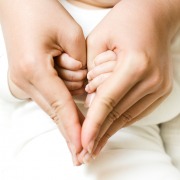Pregnancy: our rules for when to confirm and when to share are breaking women’s hearts
When to confirm a pregnancy and when to share the news that you are pregnant are, of course, personal decisions. What might be right for an individual woman varies according to her unique situation and personality. But there are social norms, unspoken (or spoken) rules that many women follow, that many women feel they have to follow. The current social norm seems to be: to confirm as soon as possible (even before your period is late) and to share at twelve weeks (not before!). This may suit some individual women, but as a social norm it is bad, really bad. We confirm far too early and we share far too late and it is breaking women’s hearts.
Just a generation or two ago women needed to wait until their period was well and truly late to confirm a pregnancy via a blood test arranged by their doctor. For the first time in human history women are confirming that conception has successfully taken place days before their period is even late (and without conferring with a doctor, midwife or wise woman). Pregnancy tests, bought over the counter in pharmacies or even in supermarkets, goad women into doing this (“accurate 10 days post-conception!” “test before your period is due!”). The trouble is, what a positive result on a pregnancy test taken before your period is due is detecting “accurately” is that a conception has technically taken place (“chemical pregnancy”). What a woman wants to know is not whether a conception has technically taken place, but whether or not she is “pregnant”. That is, can she begin to expect her belly to swell and a baby to grow? No pregnancy test can predict that accurately before your period is even due! Unfortunately, many conceptions are not viable and may be lost without any further development. With very early testing, comes very early pregnancy loss. Very early pregnancy loss, loss days to a week after your period was due, is physically similar to normal menstruation. That is, there is no passing of tissue, just blood and the pain and symptoms are similar to a normal menstrual period. My generation of women are likely to experience chemical pregnancies, normal and healthy events along the reproductive journey that women in previous generations knew as late periods, as loss. Many women today are being coaxed into having their hearts repeatedly broken while trying to conceive.
Although we are confirming pregnancies earlier, we continue to be told to shroud the first trimester in secrecy and silence, waiting until twelve weeks before sharing the news. In fact, many articles and websites on pregnancy assume that the first trimester is necessarily marked by silence (what a strong message that must give some women!). Many women are waiting until twelve weeks to share their pregnancy, not just with work colleagues and casual friends but with family and close friends. Sharing sooner is discouraged because *cue scary music* you might have a miscarriage. Yes, you might have a miscarriage. Yes, that is scary. But why is that a reason not to tell people? The assumption must be that if you experience a tragic loss you are better off weathering it alone. Um… no, very clearly no, in fact… That’s about as unsound as psychological advice can get. Social support is key to weathering all of life’s tragedies including miscarriage. If you experience a miscarriage, you’ll be better off if those you love most, your family and your close friends, know. If fact, depending on your exact circumstances, you may even be better off if your boss, work colleagues or casual friends know too.
This hiding of miscarriage by hiding the first trimester of pregnancy has another terrible social cost for women: miscarriage becomes an isolated and individual tragedy when, in fact, it is a shared loss. The whole family loses when a miscarriage occurs and miscarriage is not rare, it is common. Early pregnancy loss is an experience women share. Every second woman will experience a miscarriage by the end of her reproductive career. This means that every woman who experiences a miscarriage already has in her social network an untapped resource: women who have experienced that same event and survived. Our silence gets in the way of supporting each other. Further, there is much about how the healthcare system deals with miscarriage that can and should be improved. But this cannot happen until women organise and advocate for ourselves. And that won’t happen if we don’t talk to each other.
The secret first trimester also means that women bear the often crippling symptoms of morning sickness and bone-aching fatigue alone, bravely soldiering on through their working days and social events, trying to hide their rising nausea, absolute exhaustion and bathroom dashes. It is cruel. It is particularly cruel when you consider that the risk of miscarriage drops at eight weeks with a confirmed heartbeat, just as first trimester symptoms really ramp up. So, even if you don’t want your wider social network to know if you experience a miscarriage, the isolated soldiering on from weeks eight to twelve is still for nothing. Viability can be confirmed via a scan at eight weeks, allowing you to share your news with your wider social network and receive support and understanding for your first trimester symptoms.
Women need and deserve the support of those nearest and dearest to them from the very beginning of pregnancy. Women need and deserve the support of those nearest and dearest to them when experiencing an early loss. We aren’t meant to do this alone.
Apply it to your life: Trying to conceive? Consider waiting until your period is at least four days late, or even a full week late before confirming with a pregnancy test. In deciding who to share the news with and when consider: who do you turn to when tragedy strikes? Share your pregnancy with those people, your nearest and dearest early in the pregnancy. There is no point in waiting: you will need their support if you experience a miscarriage. Share with your wider social network as soon as works for you, given your circumstances and symptoms. Don’t assume that not sharing will make a miscarriage easier. Instead, think carefully about how widely you want to share the news and when – what’s in your best interests? Remember, confirming viability at eight weeks is an option.














Leave a Reply
Want to join the discussion?Feel free to contribute!